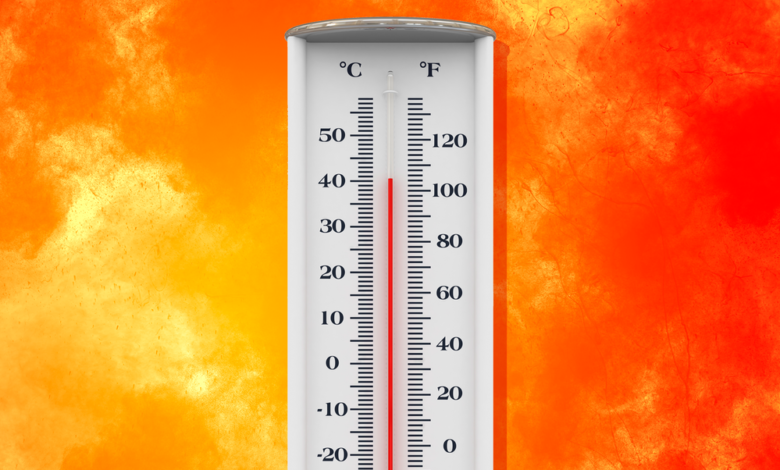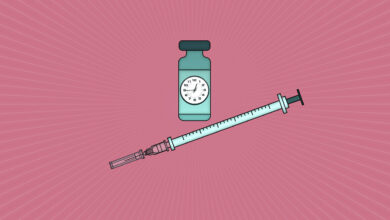Why Am I Always Hot? 10 Causes Behind Overheating and Chronic Sweating

Many people begrudgingly accept feeling warm and overdressed at all times of the year — after all, each body is unique, and there are also others who are always seemingly freezing. If you’re among this clammy, irritated tribe, over time you’ve accepted that things like sitting inside, walking upstairs, or even tucking into a fully made bed may leave you drenched in sweat; and this could all be true no matter what shape you’re currently in.
But if you’re actively trying to pinpoint what exactly is making you feel like you’re burning up at every turn, there are some considerations that aren’t as obvious as others. Menopause is certainly a thought that can cross any woman’s mind, but the end of menstrual cycles isn’t the only underlying condition that may be causing you to feel downright feverish at every turn. In fact, it’s more likely that things like medication or even a dietary choice could be impacting your body temperature.
Sometimes there are signs that can be hard to miss, but seemingly unconnected to any hot flashes — things like a racing heartbeat, feeling fatigued and tired, or fluctuations in body weight, explains Eric Adkins, M.D., an assistant professor of emergency medical care and medical director of the campus emergency department at The Ohio State University Wexner Medical Center. It’s crucial to log any symptoms like these as it may help your primary doctor connect the dots on why you’re running hot all of the time.
Whether you’ve been sweating it out for years or have recently hopped into your metaphorical furnace, think about your own medical history and how it may intersect with this phenomenon. Below, we’re recapping some of the most common health issues that end up leading to chronic overheating — including conditions that patients normally don’t catch on their own.
Editor’s Note: Weight loss, health and body image are complex subjects — before deciding to go on a diet, we invite you to gain a broader perspective by reading our exploration into the hazards of diet culture.
You’re experiencing prolonged stress or flares of anxiety.
It may be staring you right in the face, but people rarely consider the effect that poor emotional wellbeing may take on your body. If you’ve taken to the Internet to determine the source of any newfound hot flashes that simply won’t die, there’s a good chance that anxiety or stress could be playing a role.
Nearly anyone who’s nervous or anxious about something can tell you that feeling sweaty is normal — and it is! But some forms of prolonged anxiety (like social anxiety, for example) can trigger waves of nervous energy and heat on the regular; experts at the Cleveland Clinic have documented how your body’s flight-or-fight response can draw blood quickly into your core, leading your body temperature to climb rapidly. Facing a crowd or having to make a public presentation, for example, could keep you running hot for more than a few hours on end.
There are ways to treat this sudden onset heat, but if feeling sweaty is accompanied by other symptoms like chest pains or gastrointestinal issues, talking more about your anxiety with a qualified therapist is a must. There are a few other clue-ins that you might be dealing with emotional distress, leading to overheating.
Your blood sugar is at fault.
In this case, your body may be failing to correctly regulate insulin, which causes you to sweat frequently and have over-the-top reactions to steady summer heat or any sources of warmth inside your home. Officials at the Centers for Disease Control and Prevention (CDC) note that those who are prediabetic often experience this, adding that rapid blood sugar fluctuations can also trigger the same flight-or-flight response within your nervous system, causing you to feel really hot during some portions of your day — and then temporarily freezing elsewhere. Working with a healthcare provider on moving away from a prediabetic health status is easier than you may think and often revolves around addressing your diet.
Your thyroid is on the fritz.
The thyroid is a gland located in your neck that largely controls your body’s metabolism by regulating your hormones. When your thyroid is stuck in overdrive, it pumps out too many of these hormones — and can have you feeling overheated throughout the day, says Olveen Carrasquillo, M.D., a professor of medicine and public health sciences as well as the chief of the division of internal medicine at the University of Miami’s Miller School of Medicine. Feeling hot paired with unexplained weight fluctuation or feeling constantly tired or fatigued may be an indicator that your thyroid is overactive, and the issue will need to be troubleshot by a primary healthcare provider. “The thyroid test may be the most important when checking for issues surrounding overheating,” Dr. Carrasquillo adds.
You’re becoming menopausal.
Your body may be going through its natural reproductive progression (usually after the age of 45, but sometimes earlier), and there’s a time when hot flashes, the most common symptom of this change, can occur frequently as well — the period known as perimenopause. Dr. Adkins says that perimenopausal symptoms in women often include unexplainable hot flashes due to fluctuating hormones, and women may be clued into this if they’re also noticing issues like spotty or irregular periods.
Interestingly enough, the medical community at large has never been able to determine why hot flashes are so common for menopausal women, per Mayo Clinic experts. But both Dr. Adkins and Dr. Carrasquillo say that primary care providers can offer a slew of solutions for women who are hoping to put an end to the endless heat
You have a condition known as hyperhidrosis.
If you can’t seem to shut off the sweat valves even when you’re sitting calmly in a cool space, or have dealt with excess sweat to the point that it threatens your daily routine, there’s a really good chance you’re dealing with overactive sweat glands. Hyperhidrosis affects more than 14 million individuals worldwide, but many individuals go undiagnosed because it’s an issue that often coincides with other underlying symptoms that doctors may be focused on first.
The only way to treat hyperhidrosis is to turn to dermatological experts who can help pinpoint a solution for sweat that soaks your clothing or forehead or even palms routinely. Sometimes, hyperhidrosis may be caused by an underlying condition like diabetes or a thyroid issue, other aspects we’ve highlighted on this list; but more often than not, your body is capable of sweating too much even if you’re perfectly healthy.
You’re drinking too much alcohol and are dehydrated.
Nearly everyone knows that certain kinds of booze can make you feel quite warm, which isn’t due to the fact that your actual body temperature is rising, but the effect of the alcohol on your circulatory system. Alcohol can impact your blood vessels by dilating them, sending rushing blood to the outermost layers of the skin (especially in the face), per Cleveland Clinic experts, which leads to that “warm” feeling.
But Dr. Adkins adds that alcohol is more dehydrating than you’d believe, which can exacerbate feelings of being hot or parched. “Even if you’re drinking mixed drinks through an afternoon or an evening, steadily, the beverage’s alcohol content can reduce some of your abilities to sense that you’re hotter than you actually are,” he adds. “You’ll also deal with increased urine output from alcohol, and when that alcohol functions as a diuretic, then you’re making yourself a little bit more dehydrated so it’s hard to keep up with overall.”
In short, if every social interaction is marked by sweating and feeling warm, think about if alcohol is in the mix — and if it is, try swapping it out for a mocktail instead.
You’ve had too much caffeine.
We all know too much alcohol is never a great thing for our bodies — but too much coffee?! Believe it or not, caffeine can pack in more than just jitters throughout your morning. While research is divided on the topic, some experts maintain that caffeine can work to constrict blood flow naturally all while impacting your heart rate; this previous landmark study indicates that caffeine also produces heat in the body when it’s consumed. Cutting back on caffeine may be one of the easiest ways to troubleshoot why you feel so hot and sweaty all the time — especially if you’re menopausal, as a more recent 2015 report indicated that caffeine may exacerbate your hot flashes.
Your dietary choices may be turning up your internal thermostat.
“You are what you eat” is often overused and oversimplified, but if you’re keen on eating spicy foods, this may be the one time most experts stand by this proverbial saying. In the medical community, it’s common knowledge that spices in well-seasoned food can impact blood flow by opening up your blood vessels, coinciding with you feeling red-in-the-face after a particularly spicy meal. If you notice that a particular spice or ingredient is making you constantly feel hot after reviewing what you’re eating, bringing it up with your doctor may improve the situation.
Dietary choices at large may play a role in how you’re feeling after finishing any given meal; while there isn’t scholarly research established in any certain diet causing you to run hot, Dr. Adkins explains that some food groups require more energy to break down — hence why things like “meat sweats” even exist.
“Anytime you eat, that is just going to stimulate a heat-producing event for the body, as part of breaking down the substances you just consumed, between nutrient groups of carbohydrates, proteins, and fats,” he says. “Protein and the fats take a little bit more to break down, requiring more effort from the body… It may give you the sensation of increasing your core body temperature by a little bit, whereas not eating achieves the same effect in which the body’s temperature will drop a bit.”
Eating, of course, is very much necessary — but working to balance out the food groups you’re consuming may help mealtimes cool down a bit if your favorite meals are loaded in fats and heavy proteins.
Your medication is impacting your heat regulation.
Some medications are indeed responsible for fluctuating body temperatures. “There are certain medications that may create issues with heat elimination. If you’re on certain kinds of blood pressure medications, it can cause you to feel warmer, especially in the summer heat,” Dr. Adkins tells us, adding that beta-blockers designed to help with lowering blood pressure as well as things like diuretics can be at fault here.
Experts say sweating and hot flashes are common potential side effects for many medications, and your primary healthcare provider may highlight that with you when you take on a new prescription. But it’s important to report it at a later check-up anyway, as Dr. Carasquillo indicates that many medications can cause allergic reactions that are mistaken for hot flashes alone.
“If you’re taking a pill and you’re getting very hot and flushed afterward, the first thing doctors will check for is if you have an underlying allergy to that particular medication,” he adds. “Not all allergies result in a typical rash or an anaphylactic reaction, so sweating and excess body temperatures can definitely be an indicator for allergies in the right context.”
You could be pregnant.
It’s less likely than other potential root causes on this list, but many women report feeling constantly overheated during the bulk of their pregnancy. A 2013 report published in Fertility and Sterility put that figure at about a third of all women, and for some, those feelings of being chronically hot were a factor long after the birth of their child.
This content is created and maintained by a third party, and imported onto this page to help users provide their email addresses. You may be able to find more information about this and similar content at piano.io
Source link





